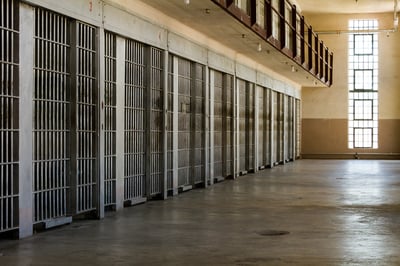Corrections Officer Among the Top Ten Most Dangerous Jobs in 2015
 CareerCast is all about jobs. They help people find jobs, and they like to rank jobs. They rank the best jobs of the year, the worst jobs of the year, and even how to get the good ones. CareerCast also produces an annual list of the most dangerous jobs, and for 2015, working with animals, firefighting, lumberjacking, and being a corrections officer topped the list. Why are corrections officers at such a high risk of accident or injury or illness? It goes beyond the fact that they deal with criminals all day every day, many of which are violent offenders. There is more to it.
CareerCast is all about jobs. They help people find jobs, and they like to rank jobs. They rank the best jobs of the year, the worst jobs of the year, and even how to get the good ones. CareerCast also produces an annual list of the most dangerous jobs, and for 2015, working with animals, firefighting, lumberjacking, and being a corrections officer topped the list. Why are corrections officers at such a high risk of accident or injury or illness? It goes beyond the fact that they deal with criminals all day every day, many of which are violent offenders. There is more to it.
Hazards Corrections Officers Face Each Day
There are things corrections officers love about their jobs. It's often easier to get good hours in a detention center than on a police beat, and in many areas, the pay is good and officers are eligible for full retirement in 20 years.Humans have a tendency to become acclimated to their environment, which means getting used to what's there all the time -- even if what's there is seriously dangerous. Just like drivers don't think about the possibility of having an accident every time they get behind the wheel, and lumberjacks aren't constantly worried about a tree crushing them to death, corrections officers don't spend 24 hours a day, 7 days a week thinking about the dangerous criminals they work with. Yes, they're aware, but it's not a constant fear. That means that there are times corrections officers are lulled into a false sense of security. These are the most dangerous times for those workers.
Corrections officers also face:- Drug addicts coming off a high
- The risk of being injured during a body or cell search
- The risk of being blindsided by an angry inmate
- The risks associated with transporting inmates
- Attacks with handmade prison weapons
- Attacks with the bare hands of inmates
- Officers are unarmed
- Some inmates suffer from mental illnesses
- Officers are susceptible to the same slip and fall accidents, injuries, and illnesses that all other workers face
Why Corrections Officers are at Such High Risk
Aside from becoming accustomed to, and even bored by, the routine of the job, officers are exposed to a number of illnesses often carried by inmates. Inmates have a higher-than-average rate of deadly diseases like Hepatitis C, the HIV virus that causes AIDS, tuberculosis (TB), and MRSA (Methicillin Resistant Staphylococcus Aureus). Inmates also typically have high rates of STDs (Sexually Transmitted Diseases), in the event that guards are sexually assaulted.
Additionally, corrections officers face all of these challenges while unarmed. Since it would be too dangerous to risk an inmate getting their hands on weapons, officers in direct contact with inmates typically are not allowed to carry firearms.
How to Protect the Corrections Officers in Your Employ With Duress Alarms
Unfortunately, there is also a dark side to working in a detention center. The work is often boring, lulling guards into a false sense of security. That's when it's easiest for inmates to jump them or use a handmade prison weapon on them. Officers need to be able to get help, even when they are unable to summon help for themselves.
Most prisons, jails, and detention centers utilize cameras to keep track of corrections officers during their shifts. However, it can be physically impossible to cover every square foot of a detention center with security cameras. That's where duress alarm systems come in. Detention facilities can protect their corrections officers and other personnel anywhere within the campus with these wireless systems. Duress alarm systems come with features like Man Down and No-Response so that corrections officers are protected by the alarm even if they are unable to signal for help. The alarm notifies other officers of who is in need of help and exactly where they are located.
To learn more about protecting the officers in your detention center with a state-of-the-art duress alarm, contact us to ask questions or to request a quote today.





